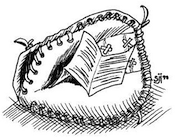 Discovered inside a catcher’s mitt in the year 2087 by archaeologists while excavating rubble in the abandoned Yankee Stadium in the Bronx:
Discovered inside a catcher’s mitt in the year 2087 by archaeologists while excavating rubble in the abandoned Yankee Stadium in the Bronx:
KOAN 1: “When you come to a fork in the road, take it.”
Commentary: Yogi gave this mystifying advice to a young second baseman being sent down to the minors after popping out too many times with the Yankees. It caused the young man to stop in his tracks, freeze, and study the wall of the Yankee dugout for over an hour. He was last seen in Troy, New York, playing for the Mohawks, still carrying a frown on his face. Hundreds of players have studied this koan as they have gone down to the minors. It sits like a boil on the forearm of pitchers—feverish, festering, a red circle surrounding a yellow mound. Once considered without spit or curves, the mind cannot escape the fork. The dust clears in the outfield.
KOAN 2: “If I didn’t wake up, I’d still be sleeping.” 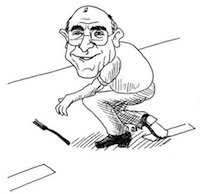 Similar to that in Koan 1, this absurd statement goes back on itself. Like the fork, it climbs on its own back and rides away in all directions at once. It forces the mind to focus on the fragile line between sleeping and waking. Yogi is thought to have made this statement to his wife one morning after a hard twilight double header. His team had won one and lost one. Like so much in life, it was a draw. His wife is said to have looked at him for a moment, turned over and gone back to sleep without a word.
Similar to that in Koan 1, this absurd statement goes back on itself. Like the fork, it climbs on its own back and rides away in all directions at once. It forces the mind to focus on the fragile line between sleeping and waking. Yogi is thought to have made this statement to his wife one morning after a hard twilight double header. His team had won one and lost one. Like so much in life, it was a draw. His wife is said to have looked at him for a moment, turned over and gone back to sleep without a word.
KOAN 3: Yogi (during a game of Twenty Questions): “Is he living?” Teammate: “Yes.” Yogi: “Is he living now?”
Commentary: The teammate was reportedly to be Joe Garagiola, and the two families were playing the game in Joe’s parlor in Hoboken in the early days. Garagiola was thinking of Dizzy Dean, then a radio commentator but formerly a pitcher. Already guessing who it was, Yogi was asking if he was living “now” because once you retired from baseball, like abandoning a koan, nobody could tell if you were alive. This koan penetrates to the core of what it is to live in the present moment and suggests the bardo to come.
KOAN 4: “Nobody goes there anymore. It’s too crowded.” 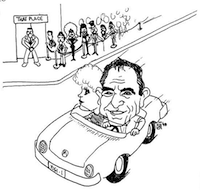 Where is “there”? The mind rebels at the idea of crowding if nobody goes there. Here Yogi encourages the person to become aware of spatial relationships among people—crowds and isolation. The paradoxes arise in the mind: If nobody goes there, then it can’t be crowded, but it must be crowded to cause nobody to go there. The mind spins in circles, a runner caught between third and home, which is a necessary condition for the mind and body to fall away.
Where is “there”? The mind rebels at the idea of crowding if nobody goes there. Here Yogi encourages the person to become aware of spatial relationships among people—crowds and isolation. The paradoxes arise in the mind: If nobody goes there, then it can’t be crowded, but it must be crowded to cause nobody to go there. The mind spins in circles, a runner caught between third and home, which is a necessary condition for the mind and body to fall away.
KOAN 5: “You can observe a lot just by watching.”
Commentary: A quiet, cool observation that relaxes the spirit while watching the sprinkler water the infield grass. Can we watch without waiting? The thought steals up behind you on soft, wet feet, just watching, just becoming aware.
KOAN 6: Umpire: “Yogi, what time is it?” Yogi: “You mean right now?”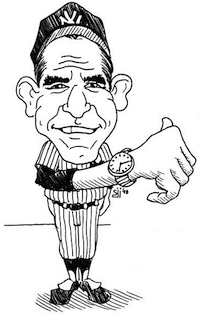 One of the greatest koans in the Yogi tradition, Yogi’s response to the umpire explodes in the mind like a pipe bomb. The umpire was blown away into outer Queens along with everyone else within earshot. He called a ten-minute recess after the comment. Fans threw tomatoes into the bullpen. Bedlam reigned. What is time? Is it right now? How can it be now if it is yet to come? If it be now, it’s not to come. If it be not to come, it will be now. Readiness is all, says Hamlet.
One of the greatest koans in the Yogi tradition, Yogi’s response to the umpire explodes in the mind like a pipe bomb. The umpire was blown away into outer Queens along with everyone else within earshot. He called a ten-minute recess after the comment. Fans threw tomatoes into the bullpen. Bedlam reigned. What is time? Is it right now? How can it be now if it is yet to come? If it be now, it’s not to come. If it be not to come, it will be now. Readiness is all, says Hamlet.
KOAN 7: “Ninety percent of baseball is half mental.”
Commentary: Yogi here forces the mind into the mathematical relationships of mind and body. Where is the other 10 percent if not mental? How much is the mind’s work? How much is the body’s work? Can they be shared? Can they be separated? Yogi suggests that they are so closely intertwined that numbers are meaningless, but there’s more here in the head than in the arm.
KOAN 8: Mayor John Lindsay to Yogi at gala New York party: “Yogi, you look real cool dressed up in a tux.” Yogi: “You don’t look so hot yourself.” 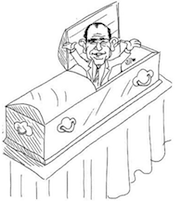 This koan goes to the heart of the situation by stripping away the pretense of the Mayor treating Yogi as a separate being. It illustrates the danger of entering into a trivial social conversation with Yogi. If the Mayor had left Yogi alone, he would have looked cool himself. But once having introduced the idle compliment, he is hooked. There is no way out, and further response to Yogi is impossible.
This koan goes to the heart of the situation by stripping away the pretense of the Mayor treating Yogi as a separate being. It illustrates the danger of entering into a trivial social conversation with Yogi. If the Mayor had left Yogi alone, he would have looked cool himself. But once having introduced the idle compliment, he is hooked. There is no way out, and further response to Yogi is impossible.
KOAN 9: “A nickel ain’t worth a dime anymore.”
Commentary: While a profound understanding of inflation underlies this absurd remark, its real thrust is to reveal the illusion of money as a medium of exchange or measure of value. The operative word in this koan is “anymore,” which strikes at the absurdity of time itself.
KOAN 10: “You’ve got to be careful if you don’t know where you’re going because you won’t get there.”
Commentary: Note the warning “be careful,” which suggests that you can get there if you don’t know where you’re going—which, of course, happens all the time in Rinzai Zen. But at a deeper level, the koan deals with the illusion of planning our lives and how fruitless it is to try to get anywhere.
KOAN 11: “I always go to other people’s funerals; otherwise they won’t come to yours.” 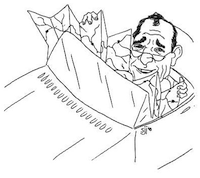 Here Yogi reveals the essence of karma, the inevitable connection between cause and effect. But again, more is implied—that cause and effect are one. All funerals are in the present, each attending the other, over and over. Life and death are one.
Here Yogi reveals the essence of karma, the inevitable connection between cause and effect. But again, more is implied—that cause and effect are one. All funerals are in the present, each attending the other, over and over. Life and death are one.
KOAN 12: Yogi (as the Mets’ coach): “We’re not exactly hitting the ball off the cover.”
Commentary: The casual misstatement of clich� contains the essence of living in the moment, forcing the mind to meditate on the confusion that results. Performance is not exactly the purpose of life. Winning is not exactly the purpose of games. Yet the koan implies a conventional assessment of playing the game: the batters are not exactly hitting the ball off the cover of the stadium, a feat unaccomplished in the history of the sport.
KOAN 13: Yogi (with a score of Chicago 12, Mets 2, at the end of the third inning): “It’s getting late early.” 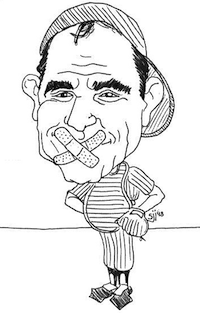 How can “late” be “early”? The baseball score is the reality but in a time-space continuum. For the Mets, time has swiftly passed by and opportunity has been lost. Yogi is saying “Take heed.” He deftly hurls the two time concepts at each other and waits to see if we awaken.
How can “late” be “early”? The baseball score is the reality but in a time-space continuum. For the Mets, time has swiftly passed by and opportunity has been lost. Yogi is saying “Take heed.” He deftly hurls the two time concepts at each other and waits to see if we awaken.
KOAN 14: “I really didn’t say everything I said.”
Commentary: This is Yogi’s version of “The Tao that is known is not the eternal Tao.” What is known is not known. You’re on your own; there’s nobody else out there. This final summary of Yogi’s teachings parallel the truth of his spiritual slogan: “Light a candle to yourselves.”
Thank you for subscribing to Tricycle! As a nonprofit, we depend on readers like you to keep Buddhist teachings and practices widely available.